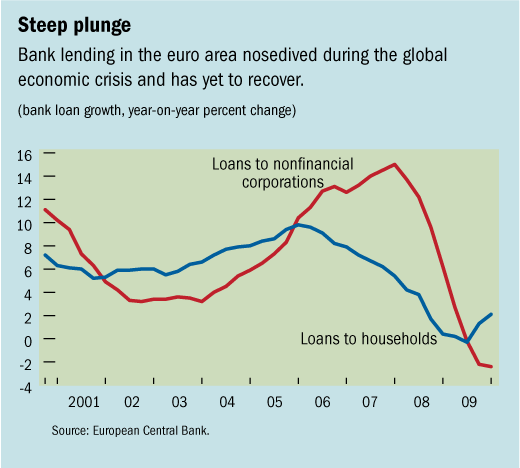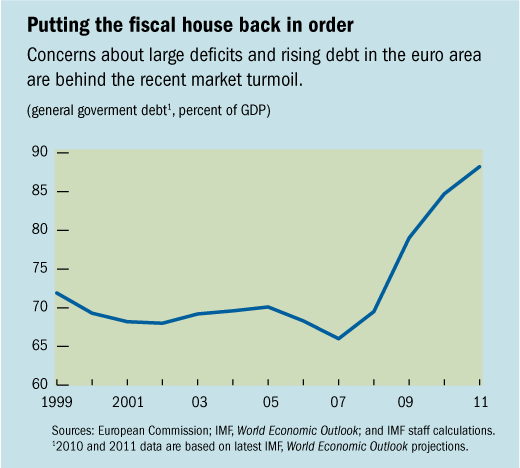
Typical street scene in Santa Ana, El Salvador. (Photo: iStock)
IMF Survey: Euro Area: Restoring Confidence Key to Growth
July 21, 2010
- Credible bank stress tests essential to restore confidence
- Action needed to establish fiscal sustainability and restore growth
- Wake-up call to strengthen area-wide economic governance
Before the euro area economy could recover firmly from the global crisis, it was hit by market concerns related to the sovereign debt of some of its members.

The IMF is predicting a slow and fragile recovery for the euro area, with average growth of just 1 percent of GDP for 2010 (photo: Newscom)
ECONOMIC HEALTH CHECK
The turmoil has clouded the prospect of a strong regional and global recovery, with the IMF now projecting average growth of just 1 percent for 2010, rising to 1¼ percent in 2011.
Strong action by members of the European Union to establish a European Stabilization Mechanism to help countries in difficulty has helped calm markets, as has austerity plans announced by a number of countries, including Greece, Ireland, Spain, and Portugal. The European Central Bank (ECB) has also proved to be an anchor of stability throughout the crisis. Following much debate, the results of bank stress tests conducted on a large set of banks in the 27-member European Union will now be published on July 23. Successful tests should allay market concerns about the health of major European banks, and boost confidence in the euro area.
These are all positive developments. But concerted action to sort out public finances across the euro area, and a strategy for reinvigorating growth and creating jobs will be key to achieving a sustained recovery, the IMF said in its annual health check of the 16-member euro area. Restoring growth is not just important for its own sake―it is also essential to lay to rest worries about public debt.
The report, which was discussed by the IMF’s 24-member Executive Board on July 19, also stressed the importance of reforming the euro area’s economic governance.
Improving confidence in the financial system
A well-functioning financial system will be crucial to strengthening the moderate and uneven recovery that is currently under way in the euro area. But continued worries about public finances may impact the financial system adversely, the IMF warns in its report. In turn, problems in the financial system threaten the real economy. They make life especially difficult for the small and medium-sized enterprises, which depend on a sound banking system to continue to create jobs and deliver the majority of goods and services to households (see Chart 1).

To gauge the underlying health of the banking system, authorities in the euro area are subjecting major banks to “stress tests.” These tests simulate how well banks would perform under adverse economic and financial conditions. The European stress tests are overseen by national supervisors in the countries involved in the exercise, and coordinated by the Committee of European Bank Supervisors. They are aimed at testing the resilience of large banks to credit losses in the corporate and household sectors, and at assessing the effect of continued reliance on government support on large banks in the euro area.
The broad coverage of institutions and risks should allow for a credible test. To maximize confidence building, the IMF report recommends full disclosure of the findings and effective follow up. Ideally, banks should be able to replenish any capital needs from private sources. But a backstop from official sources may be necessary. In that regard, the report notes, the recent extension by many euro area countries of existing recapitalization and guarantee schemes is reassuring.
Resolving tensions in the banking system is also key to allow consumers, companies and others to benefit from the low policy rates of the ECB. The ECB has stepped up its non-standard operations to ensure sufficient liquidity and help ease tensions. These measures are entirely appropriate as a response to the difficult conditions prevailing in the markets. But over the medium term, banks should interact with each other rather than through the central bank to ensure the proper functioning of the financial system.
Sorting out the public finances
Concerns about large deficits and rising debt are at the core of the crisis of confidence now affecting the euro area (see Chart 2). Yet fiscal policy has also played a key role in avoiding a worse outcome and supporting the recovery. To balance these concerns, the euro area’s fiscal stance, in aggregate, is correctly set to be neutral in 2010, with consolidation beginning in 2011. Some large economies, especially Germany, are still providing stimulus, offsetting the tightening by those countries that have no choice but to undertake immediate fiscal adjustment, given market tensions.

But medium-term sustainability must be established in all countries. Germany and a few other countries have shown the way by defining specific plans for a gradual and sustained consolidation. Other countries will need to follow suit to convince markets that public debt will not spiral out of control.
In reducing deficits, countries should ensure that the quality and composition of their measures is as demand-friendly as possible. From this perspective, selective rather than across-the-board reductions in expenditure are the way to go. Easing tax distortions, for example by broadening the tax base or shifting its structure, will also be helpful.
In their discussion of the report, Directors emphasized that the long-standing problem of anemic growth now needs to be addressed. High growth is not only important for its own sake, but essential to lay worries about public debt to rest. Priorities are well known: they are country-specific and well spelled out in the European Union’s Lisbon and EU2020 strategies. There is, however, no need for a lengthy new process. Action should be immediate and not limited to countries with excessive imbalances. It should be undertaken throughout the euro area to generate confidence, display cohesion, and improve overall investment and growth prospects.
Adapting economic governance of the euro area
The crisis highlighted that policies have not been sufficiently disciplined to allow for the effective functioning of European Monetary Union (EMU). This has triggered a debate on how to remedy deficiencies in economic governance in the euro area. It will be important that proposals currently on the table lead to far-reaching changes in existing policy frameworks:
• Fiscal discipline needs to be enforceable. While it is important to strengthen sanctions and coordinate budget procedures, in the long run, shifting more policy authority to the euro area level, for example by issuing binding deficit limits, will be essential. Meanwhile, national rules could usefully be strengthened to reflect the need to limit deficits.
• Key structural reforms will also need to be enforced. A successful EMU will require a certain degree of harmonization of labor taxation, employment protection, and unemployment benefit systems on the one hand, and further convergence in administrative and product market regulations on the other.
• On financial stability issues, progress is well advanced with EU institutions for systemic risk and prudential regulation to be set up by year-end. Doing the same for crisis management and resolution would fill the remaining gaps.
The euro area has faced a severe market test in recent months. The current turmoil resulted from unsustainable policies in some member countries, delayed repair of the financial system, and a lack of progress in fixing the deficiencies in economic governance laid bare by the global economic crisis. Action is now under way on all these fronts. If this momentum is sustained, it should allow the recovery now under way to gain solid ground.


